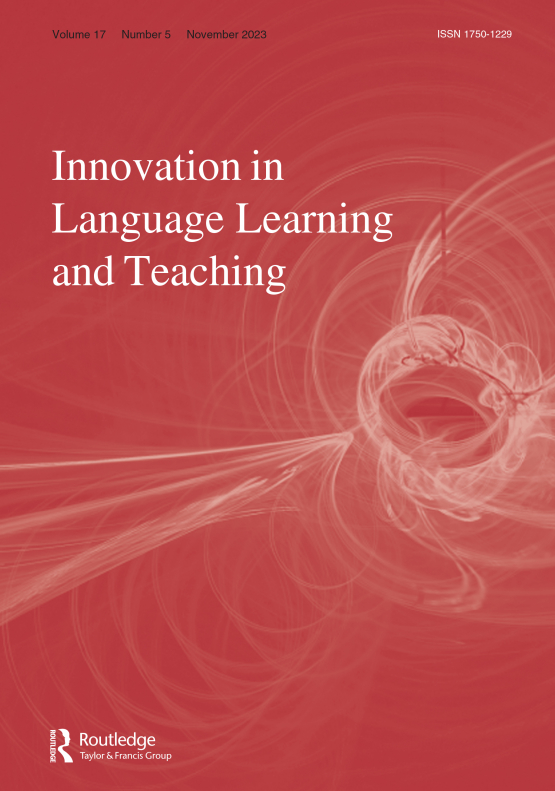Submit a Manuscript to the Journal
Innovation in Language Learning and Teaching
For a Special Issue on
Critical AI Literacy in Language Education
Abstract deadline
Manuscript deadline

Special Issue Editor(s)
Yijen Wang,
Waseda University
y.wang@aoni.waseda.jp
Jia Li,
Ontario Tech University
Jia.Li@ontariotechu.ca
Glenn Stockwell,
The Education University of Hong Kong
gstock@eduhk.hk
Christoph Hafner,
City University of Hong Kong
c.hafner@cityu.edu.hk
Critical AI Literacy in Language Education
Aims and Rationale
The rapid adoption of artificial intelligence (AI) within language education compels educators and researchers to confront not only new instructional possibilities but also complex questions about control, agency, and responsibility. As intelligent tutoring systems, automated feedback tools, conversational agents, and large language models increasingly shape language learning processes, they embed specific assumptions about language, communication, and knowledge that may not always align with pedagogical or ethical priorities (Jones & Hafner 2021; Ma et al., 2024; Stockwell, 2024). In this context, AI literacy has emerged as a critical area of concern.
Developing AI literacy in language education involves more than acquiring technical skills to operate AI tools. It requires learners and educators to critically examine how AI systems are designed, how their outputs are produced, and whose interests they serve (UNESCO 2023; Tour, Pegrum, & Macdonald, 2025; The Open University, 2025). As AI systems increasingly participate in shaping learners’ linguistic choices, identity formation, and engagement with knowledge, language education must foreground questions of power, ethics, and learner agency alongside considerations of functionality (Stockwell, 2024). In addition, like other forms of critical digital literacy, AI literacy also involves an affective dimension (Jones, 2022; Ng et al., 2023). Although recent scholarship in the field has begun to explore AI’s pedagogical affordances, much of this research remains focused on tool implementation experiences and performance outcomes. Systematic inquiries into how AI literacy is theorized, operationalized, and critically assessed remain scarce. In particular, issues such as algorithmic bias, surveillance, data ownership, opacity, and unequal access demand urgent attention if AI integration is to serve rather than undermine educational equity (UNESCO, 2023, The Open University, 2025).
This special issue positions critical AI literacy as a central research agenda for the field. We invite contributions that examine how language learners and educators engage with AI critically and ethically. Submissions may address conceptual frameworks, empirical investigations, pedagogical innovations, and assessment models that advance our understanding of AI literacy across diverse language learning contexts. Topics include definitional models, intersections with language skill development, learner agency, teacher education, ethical and socio-emotional dimensions, assessment practices, and implications for equity, diversity, and inclusion. By centering critical AI literacy, this special issue seeks to foster a more reflective, ethically grounded, and socially responsive approach to AI integration in language education.
Proposed Topics
Contributions to this special issue may address, but are not limited to, the following areas:
- Empirical studies, e.g., design-based research, and case studies, examining AI literacy initiatives
- Perspective articles theorizing AI literacy within computer-assisted language learning
- Definitional frameworks and operational models of AI literacy for language learners and educators
- Intersections between AI literacy, cognition and the development of language skills
- Learner agency, autonomy, and identity construction in AI-mediated environments
- Teacher roles, pedagogical strategies, and professional development for AI literacy integration
- Ethical, legal, and responsible use of AI in language education
- Socio-emotional and other affective factors influencing AI integration for language teaching and learning
- Assessment of AI literacy: models, measures, and evaluation challenges
- Cultural and multilingual perspectives on AI literacy development
- Language learners and teachers’ motivations in AI adoption
- Classroom interventions and curricular designs promoting critical AI engagement
- Equal access to AI literacy
- The impact of AI literacy on equity, diversity, and inclusion in language learning
References
Jones, R. H., & Hafner, C. A. (2021). Understanding digital literacies: A practical introduction. Routledge. https://doi.org/10.4324/9781003177647
Jones, R. H. (2022). Commentary: Critical digital literacies as action, affinity, and affect. TESOL Quarterly, 56(3), 1074–1080. https://doi.org/10.1002/tesq.3153
Ma, Q., Crosthwaite, P., Sun, D., & Zou, D. (2024). Exploring ChatGPT literacy in language education: A global perspective and comprehensive approach. Computers and education: Artificial intelligence, 7, 100278. https://doi.org/10.1016/j.caeai.2024.100278
Ng, D. T. K., Wu, W., Leung, J. K. L., Chiu, T. K. F., & Chu, S. K. W. (2024). Design and validation of the AI literacy questionnaire: The affective, behavioural, cognitive and ethical approach. British Journal of Educational Technology, 55(3), 1082–1104. https://doi.org/10.1111/bjet.13411
Stockwell, G. (2024). ChatGPT in language teaching and learning: Exploring the road we’re travelling. Technology in Language Teaching & Learning, 6(1), 2273. https://doi.org/10.29140/tltl.v6n1.2273
The Open University. (2025). A framework for the learning and teaching of critical AI literacy skills. https://www.open.ac.uk/blogs/learning-design/wp-content/uploads/2025/01/OU-Critical-AI-Literacy-framework-2025-external-sharing.pdf
Tour, E., Pegrum, M., & Macdonald, S. (2025). Engaging English language learners in AI literacy practices: A conceptual framework and practical strategies for educators. English Australia Journal, 41(1), 27–46. https://doi.org/10.61504/YBUY9086
UNESCO. (2023). Guidance for generative AI in education and research. UNESCO. https://doi.org/10.54675/EWZM9535
Submission Instructions
Proposed Timeline
Abstract Submission Due Date: 31 October, 2025
Invitation Notification: 30 November, 2025
Manuscript Submission Due Date: 31 August, 2026
Expected Publication Date: Early 2027
Potential contributors should submit a 350-450-word abstract of their proposed contribution, in line with the scope of the call outlined above. The abstract should be submitted to the Special Issue Guest Editors (ai.critical.literacy@gmail.com).

